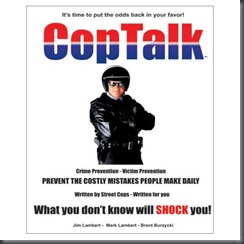Here is a pretty good article about what recruiters are looking for..
16 Traits Recruiters are Looking For
Excerpted from the bestselling book – Confessions of a “Hardass†– An insider’s advice on passing your law enforcement pre-employment interview.
When a law enforcement or corrections agency interviews you, what is really happening is that they are deciding how well you fit in with the people, the mission and the daily work environment of the organization. Each agency has aspirations of greatness – the leaders, managers and the career minded officers / deputies and staff all want what is best for the agency – and that translates to the best people possible to work beside them. They judge these areas by exploring your background – usually starting in high school, through your education and of course your employment and personal history.
Some of these traits will also be judged by volunteer and neighborhood activities, and even hobbies. After exploring your background, they will ask stressful scenario questions, aimed at giving them information on how to rate you, without you even being aware of it. Everyone I’ve ever interviewed for a law enforcement position told the interview panel what we needed to know about all 16 of these areas, whether they were aware of it or not. Of course, no one is expected to be perfect. But the closer you can get to “10†in each of these areas through answering the questions that will be asked, the better your chances of being hired.
Here are the traits and principles involved in oral interviews and assessments. Give yourself a 1 (lowest) to 10 (highest) for each one. Think honestly about your life, your work history, volunteer history, hobbies, your education and everything else about you, and then ask yourself inwardly some very tough questions about each of these areas. As an example, have you ever been detained, ticketed or arrested by the police? If yes, one or more of these areas will give the board critical information – so BE PREPARED! Since no one is looking over your shoulder, rate yourself honestly in order to see how how well or poorly you do, so you will be able to focus on the areas needing the most improvement.
Full article here:
http://edu.policelink.com/v/flip_ch_pm_2_ocp/articles/3998-16-recruiting-traits









I was the Legal Advisor for a 600 officer department, and participated in candidate interviews. Later, I was chief of a 40 officer police department, and I also have taught criminal justice management courses at a local university.
I believe it is important to know a much as possible about the agencies where you are applying, as law enforcement agencies are far from generic, and look for different qualities in applicants.
For example, many departments either unofficially or officially (the practice has been upheld by at least one United States Court of Appeals) attempt to screen out applicants who are deemed overly intelligent. In some cases, they actually set a maximum acceptable score on the I.Q. component of the battery of tests. In other cases, it is less objective, but just as real- looking at the scores and reacting negatively to candidates who are too quick or too articulate during the interview process.
Although I do not know of any agencies that formally bar “over educated” applicants, many do so on an unofficial basis. At a meeting of a state municipal association that I attended, the assistant chief for a municipal department openly stated that he’d “rather hire a man (sic) with a G.E.D. than one with a master’s degree, any day of the week.”
I hasten to add that there are other agencies that welcome bright, articulate, well educated applicants. It is a matter of knowing the agencies, then deciding both where you would like to work, which agencies are likely to give you serious consideration, and how best to present yourself in the interview process (you can’t do a lot about your school records and your test scores).
It also depends on your career goals. If you envision yourself spending most of your career working the streets, in uniform and/or as a detective, retiring at 50, or whatever, you may wish to apply with a large department, where there is likely to be more action and major felonies, a good pension program, and regular promotional opportunities. On the other hand, if you want more of a community/service oriented experience, less bureaucracy (but, that can translate to more latitude for favoritism or even nepotism), and a greater variety of experience, you may wish to look at smaller agencies.
If you want to someday be a chief of police, I definitely would recommend working in a smaller department, then possibly “jumping ship” after you have had a variety of assignments, and can market yourself as a “generalist.” In my case, I acquired experience elsewhere, then was hired by a department as its deputy chief. Two years later, when the chief retired, I applied for his position and eventually was selected. It was a department with only forty officers and we moved people between patrol, investigations, crime prevention, etc. Of the people who served under me during the dozen years I was with the department, a dozen went on to become chiefs or assistant chiefs of other agencies. A couple of times, our people found that, after the initial cuts, both final candidates were from our department.
On the other hand, our department placed so much emphasis on the quality of reports, playing by the rules (e.g. the Bill of Rights and our state’s criminal procedure code), and treating people with respect that many experienced police officers who came to work for our department soon crashed an burned or else became frustrated and left. There were other experienced people who found it was best work environment they’d ever had. It’s a matter of taste and your own abilities and proclivities. A bit of advance research may save you a few years of frustration and/or pursuing dead ends.